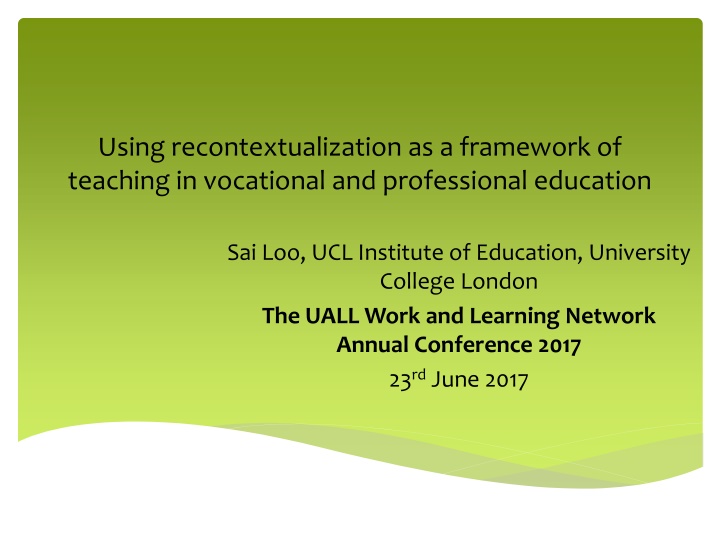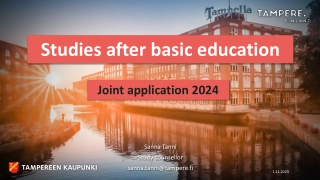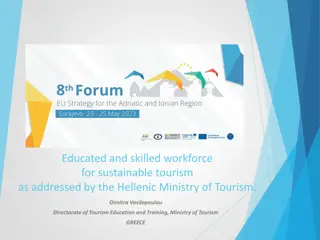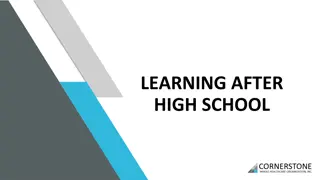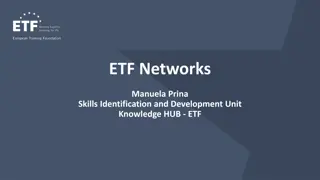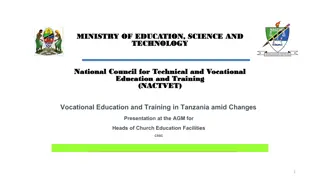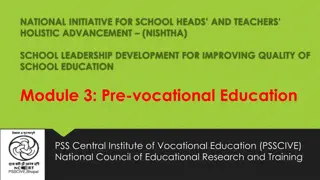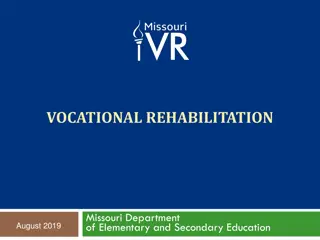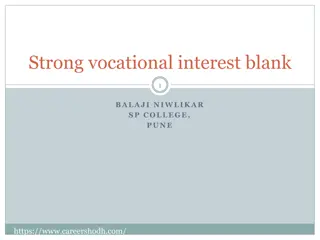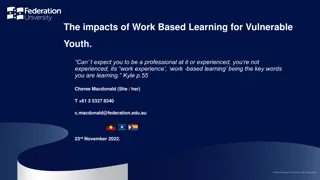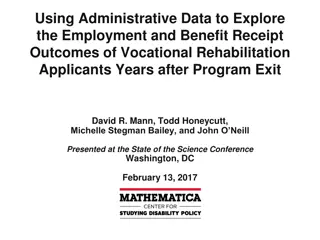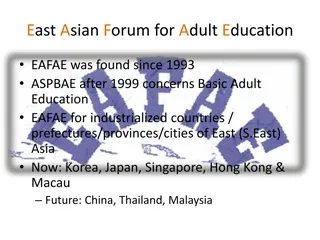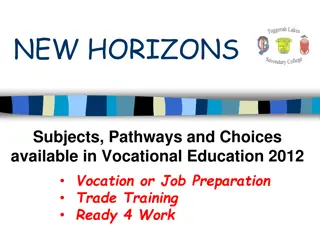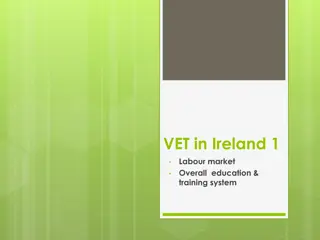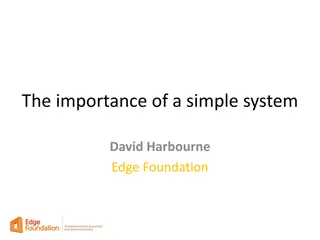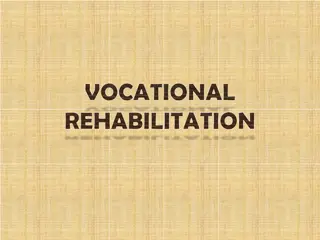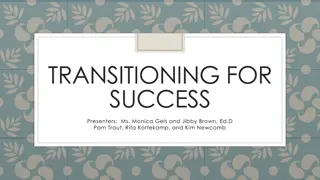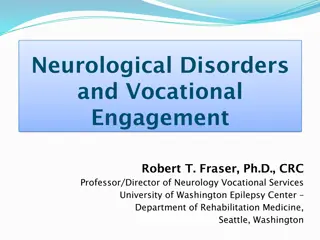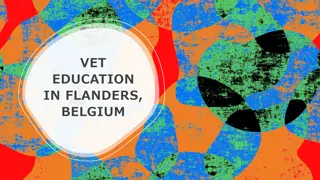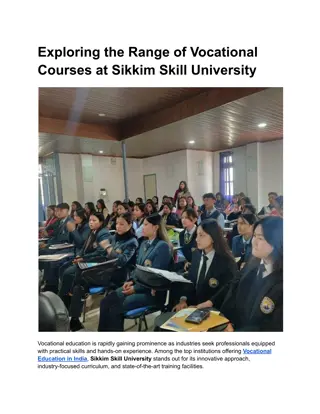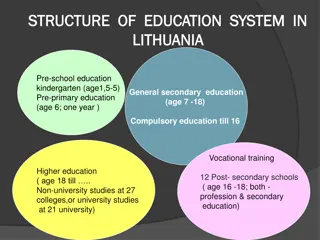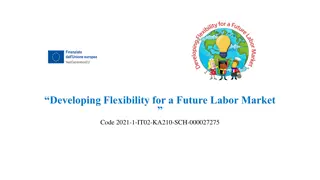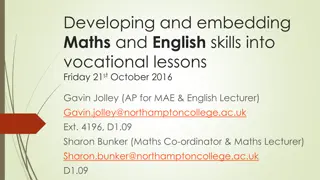Recontextualization in Vocational Education
This study explores the framework of using recontextualization in vocational and professional education, focusing on pedagogy, knowledge acquisition, and application in work-related programs. The research delves into theoretical and conceptual frameworks, project details, and case studies to enhance understanding and implementation.
Download Presentation

Please find below an Image/Link to download the presentation.
The content on the website is provided AS IS for your information and personal use only. It may not be sold, licensed, or shared on other websites without obtaining consent from the author.If you encounter any issues during the download, it is possible that the publisher has removed the file from their server.
You are allowed to download the files provided on this website for personal or commercial use, subject to the condition that they are used lawfully. All files are the property of their respective owners.
The content on the website is provided AS IS for your information and personal use only. It may not be sold, licensed, or shared on other websites without obtaining consent from the author.
E N D
Presentation Transcript
Using recontextualization as a framework of teaching in vocational and professional education Sai Loo, UCL Institute of Education, University College London The UALL Work and Learning Network Annual Conference 2017 23rdJune 2017
Introduction Rationale for this study teaching of work-related programmes: pedagogy and knowledge (Bernsteinian approach) Terminology: vocational, TVET, higher vocational, professional and occupational Brian Simon and pedagogy Three levels of study Structure of this presentation
Theoretical Frameworks Dual professionalism (Handal, 1999; Peel, 2005) as a starting basis Teachers/deliverers/lecturers and occupational practitioners Bernstein s (1996) vertical and horizontal discourses/knowledge and recontextualization as conceptual foci Eclectic definition of knowledge Theoretical frameworks for knowledge acquisition by Becher (1994), Shulman (1987), Loughran et al. (2003), and Clandinin (1985) Conceptual frameworks for knowledge application by Barnett (2006), Evans et al. (2010), Loo (2012; 2014), Winch (2014), Evans s knowledgeable practice (2016), Kemmis & Green s practice architecture (2013) and Kahneman s Systems 1&2 (2012)
Project details Context of the project BERA Post-Compulsory and Lifelong Learning SIG Research questions: 1. What is occupational pedagogy? 2. How is its related knowledge acquired and applied by those teaching on the programmes? Research methods: questionnaire survey and semi-structured interviews with participating teachers and documentary evidence. 21 participants from three education sectors: TVET (7), first-degree (7), and professional education (7).
Case Study I Fashion and textiles OP5 teaching contexts Acquisition of knowledge as practitioner (yarn, tango & Alexander McQueen) and teacher (occupational practices, digital and manual, knowledge stored in my head & extra-curriculum activities). Explicit and tacit types of know-how Application of knowledge for teaching (e.g. QEI fashion show, symbiotic relationship, peer learning, supportive institution) I want to offer my students a whole broader view of life and learning and depending on the background of the students and the sharing within the class how this grows a person. A planned class is one thing but to have a store of knowledge from personal enthusiastic research into the breadth of art and design through visiting London [e.g. the McQueen exhibition at the VAM] and other exhibitions, then reflection in action the knowledge that can be used spontaneously bringing energy to the regular learning plan.
Case Study II Clinical training in Emergency Medicine OP16 teaching contexts EM is a social science discipline Acquisition of knowledge for teaching and occupational practice - theoretical know-how , relevance to medicine, A&E characteristics, informal know-how Application of know-how for teaching and practice Kahneman s Systems 1 & 2 (The Fall), Greenhalgh & Hurwotz s interpretive analysis of narrative (Patient s fall) I have changed the way I talk to people, reflect and work things through with them (e.g. the numerous stakeholders in this collaborative role in EM). When I am on the shop floor, I try to say to myself when I do not have the theoretical knowledge; I need to be constructive in discussions where colleagues may be critical and careful how to speak to other trainees and colleagues. One needs to bear in mind the organisational culture of being in a hospital where interactions and negotiations with other departments such as renal and CT scans are necessary. My secretary who is in her 70 s has built up a tremendous network for this.
Contributions and Implications Contributions: There are programme pathways to occupational work; Occupational pathways are more direct for those work-related provisions at higher academic levels e.g. in areas of dental hygiene, EM and clinical medicine than those at the TVET level; Two strands of practices exist at the outset; Integrated Applied Recontextualization process provides a critical understanding of how the modified teaching, occupational and work capacities are combined to inform the application of appropriate teaching strategies to specific pedagogic settings; Learners acquire the occupational capacities over the course duration. These work-related capacities include abilities, capabilities, dispositions, experiences, judgement, knowledge, protocols, skill sets and techniques; Deliverers require the relevant occupational experiences to teach on work-related programmes and; Continuous professional development is needed for deliverers to maintain their on-going professionalisation in the two practice strands of teaching and work. Implications: teachers, managers and policy makers of occupational courses.
Finish! Thank you for listening and any questions gratefully received. Loo, S. (2018 - publish in Sep. 2017). Teachers and Teaching in Vocational and Professional Education. Abingdon: Routledge. Recent and forthcoming publications Loo, S. (2017). Creative Working in the Knowledge Economy. Abingdon: Routledge. Loo, S. and Jameson, J. (Eds.). (2017). Vocationalism in Further and Higher Education: Policy, programmes and pedagogy. Abingdon: Routledge. Loo, S. & Smith, E. (Eds.) (TBA) Teaching and Learning for Occupational Practice: A multi-disciplinary and multi-level perspective. Loo, S. (TBA) Teachers, education and their professional contexts across the post-compulsory and lifelong learning sectors.
